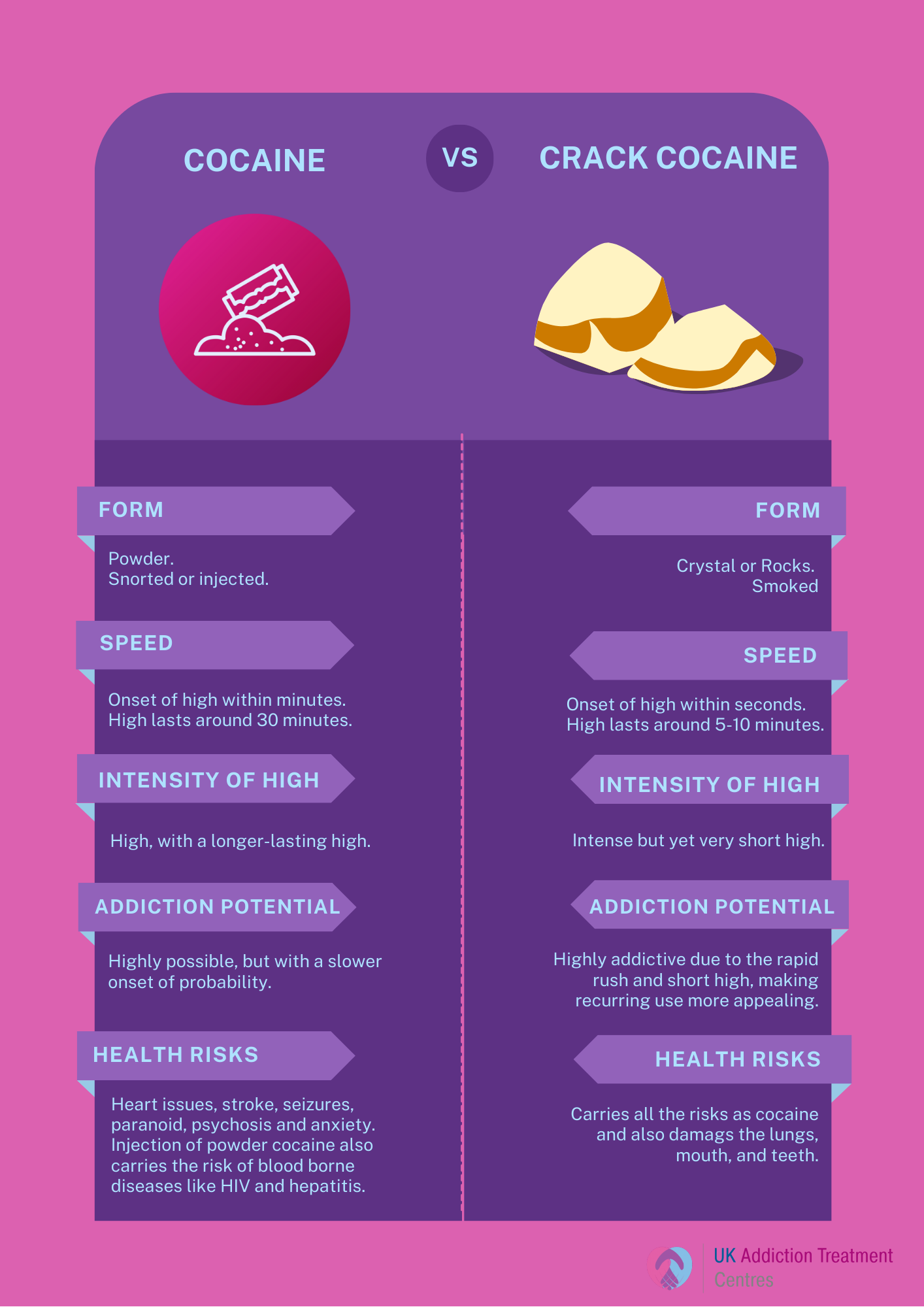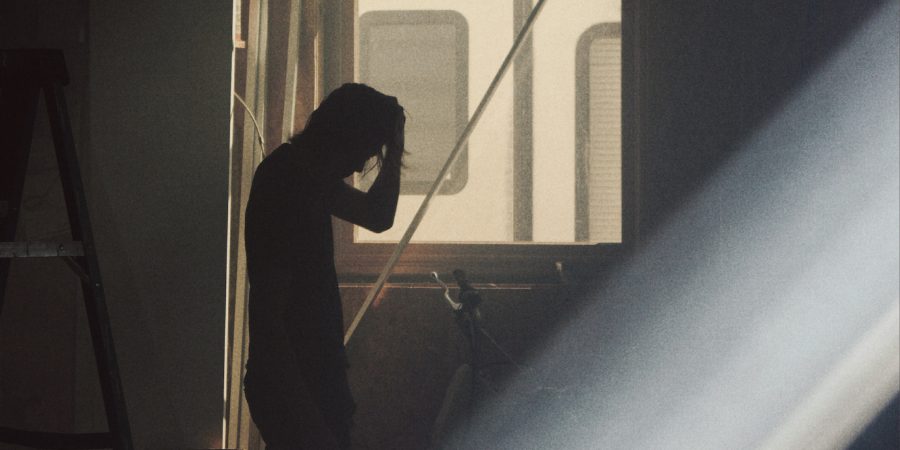
Written by:

Medically Reviewed by:
Last Updated:
October 13th, 2025
Crack cocaine addiction
What is crack cocaine?
Crack cocaine begins as the same powdered cocaine most people are familiar with, but it doesn’t stay that way for long. When the powder is mixed with water and baking soda, then heated until it hardens, it transforms into small, rock-like chunks that can be smoked instead of snorted. The name “crack” comes from the snapping sound these rocks make when heated, a noise that has become as much a part of the drug’s identity as its appearance.
Crack cocaine might sound like nothing more than a name change or a slightly different way of preparing cocaine powder, but that small shift in production completely alters what it is. By turning the powder into smokable rocks, the drug hits harder and faster, with effects that feel overwhelming compared to the effects of snorting powdered cocaine.
What is crack cocaine?
Crack is a solid, or “rock”, form of cocaine created by mixing water, powdered cocaine, and either baking soda or ammonia and heating the mixture resulting in a free-base form. This relatively easy production of crack, along with the immediate and potent high, resulted in its popularity soaring in the 1980s and has since led to millions of people suffering from crack cocaine addiction.
The name ‘crack’ is derived from the crackling noise the drug makes when it’s smoked. While the name crack cocaine is itself a slang term, there are other street names for the drug, including ‘hard rock’, ‘base’, ‘sugar block’, ‘candy’, ‘cookies’, ‘kryptonite’, ‘rock’, ‘jelly beans’, ‘nuggets’, and ‘apple jack’ amongst others.
Users usually smoke crack using a glass pipe with gauze (‘screens’) or using foil and a straw. Crack can appear as off-white, white, yellowish, or light pink chunks.
Effects of crack
Once inhaled into the lungs, the active components are quickly absorbed into the bloodstream resulting in a fast but short-lived high, typically lasting five to fifteen minutes. The brain is flooded with dopamine, leading you to experience intense feelings of euphoria, increased energy and alertness, and increased sensitivity to stimuli.
Where crack takes this to another level is in how it’s used. Powder cocaine is usually snorted, which takes minutes to bring on a high. Crack is smoked, and when its vapour hits the lungs, it surges into the bloodstream and reaches the brain in seconds. That speed makes all the difference as it produces an intense rush that the brain locks onto. The quicker the reward, the more powerful the “learning” and soon the brain starts chasing that rush with a sense of urgency that’s hard to break.
This is why crack cocaine is often described as one of the most addictive forms of any drug. It’s not that its chemistry is wildly different, but the way it floods the brain so fast makes the connection between smoking it and feeling good almost impossible to separate.
Is crack cocaine prevalent in the UK?
After the crack cocaine epidemic in the United States during the 1980s, many people assumed it was an overseas problem and that crack wasn’t something to worry about in the UK. While that assumption held some truth at the time, it no longer reflects reality. Crack is simply a different way of preparing cocaine. There isn’t a secret ingredient only available in America, and as long as there’s cocaine powder and heat, dealers can make it. Also, if something as addictive as crack brings in more money, there’s little reason for dealers here not to sell it.
These aren’t empty assumptions either. The data shows how crack use has spread in the UK, and what was once considered a distant issue has become a real cause for concern, much closer to home.
Concerning UK crack cocaine statistics
- In 2023/24, there were 10,374 adults in treatment across England for crack cocaine alone. This figure accounted for roughly 3% of all people in structured treatment.
- Looking at new entrants, 5,444 people began treatment in 2022/23, citing crack as their main problem substance. This was an increase compared to the year before, signalling that more people are stepping forward for help with crack use specifically, rather than as part of a wider heroin–crack pattern.
- In the year ending March 2024, law enforcement agencies seized just over 40 kilograms of crack cocaine across England and Wales. While this represented a slight decline compared with the previous year, the bulk of seizures came from local police rather than Border Force. This could point to the fact that crack is mainly traded and consumed within domestic markets rather than being intercepted at entry points.
- In 2023, the Office for National Statistics recorded 1,118 deaths involving cocaine. Although this figure combines both powder and crack cocaine, it represents a 30% rise from 2022 and stands as the highest annual total on record.
What the data shows
Although crack cocaine represents a smaller group compared to other poly-use figures, the steady treatment demand, consistent seizures and sharp rise in cocaine-related deaths indicate that it is a persistent and damaging presence in the UK. It may not dominate national headlines but it continues to weigh heavily on treatment services, policing and communities.
The truth is, though, statistics can feel cold on a page. But each number represents a person struggling with an addiction that can take over every corner of life. In the next section, we’ll look at just how deep those roots of addiction can run.
How can a crack cocaine addiction affect a person’s life?
Crack cocaine addiction rarely only affects one area of life; in fact, it spreads into all of them. Some effects appear quickly, while others creep in slowly until they’re impossible to ignore. At first, it can feel manageable: you might notice a cough or the odd sleepless night, but the trade-off seems worth it because you’re still able to use. The real problems come with prolonged use, when those “small” health changes develop into serious, sometimes life-altering issues. By the time they’ve taken hold, reversing them can be incredibly difficult.
Health problems
- Damage to the lungs from smoking vapour, leading to chronic cough, infections and shortness of breath
- Increased strain on the heart that raises the risk of heart attack and stroke
- Malnutrition from suppressed appetite, leaving the body weak and more vulnerable to illness
- Neurological issues, including seizures and long-term cognitive decline
- Higher risk of mental health conditions such as anxiety, paranoia and depression
- A weakened immune system that leaves the body struggling to fight off everyday illnesses
Lifestyle problems
- Severe financial strain as large amounts of money are funnelled into buying crack
- Loss of trust and closeness in relationships as lying, secrecy or theft take over
- Unemployment or academic failure due to neglected responsibilities and poor performance
- Social isolation when non-using friends and family distance themselves
- Increased risk of legal consequences from possession, dealing or behaviour linked with funding use
- Unsafe living conditions, such as stable housing or security, are lost through addiction
Crack cocaine’s impact builds until it reshapes every aspect of your life in ways that are hard to undo. Recognising the signs of crack cocaine addiction and how deep it can reach is a crucial step in seeing why getting help matters.
What are the signs of crack cocaine addiction?
Recognising the signs of crack cocaine addiction can be the difference between catching a problem early and letting it spiral out of control. Because crack is such an intensely addictive drug, it doesn’t take long before the effects begin showing themselves in clear and visible ways. Spotting those signs in yourself or someone close to you is important, not only because it makes intervention possible but because it gives you a better picture of how the drug may already be shaping your life.
- Rapid weight loss that gives the body a thin, unhealthy appearance
- Pupils that stay dilated even when the lighting changes
- Repeated nosebleeds linked with damage to delicate nasal tissue
- A harsh, lingering cough that develops from smoking the vapour
- Burn marks on fingers or lips from handling or inhaling through hot pipes
- Cravings that dominate thoughts throughout the day
- Bursts of euphoria followed by crushing lows
- Irritability that becomes constant and difficult to manage
- Paranoia that leaves it hard to trust people around you
- Anxiety that lingers long after the effects of the drug fade
- Neglect of responsibilities at work, school or home
- Growing secrecy about time, money and activities
- Theft of money or belongings to fund use
- Isolation from friends and family who don’t take drugs
- Bingeing for long periods followed by extended crashes
Knowing these signs is a first step, but it’s not the whole picture. If any of them feel familiar, it may be time to take a closer look at your relationship with crack cocaine, and that’s exactly what the next section will help you do.
Do I have a crack cocaine addiction?
Reading through a list of signs and symptoms can feel overwhelming. Some of them might ring true, others might not, and it’s easy to be left wondering where you actually stand. One of the best ways to cut through that uncertainty is to check in with yourself more directly—truly recognise how you’re really using crack and how it’s shaping your life.
Here are some questions to ask yourself:
- Do you find yourself craving crack even when you’ve promised yourself you won’t use it again?
- Have you ever skipped work, school or important commitments because of smoking crack?
- Are you spending money on crack that was meant for bills, food or other essentials?
- Do you continue to use crack even though it’s caused problems with your health, relationships or the law?
- Have you tried to stop using crack but found yourself going back to it quickly?
- Do you spend large parts of your day either using crack, recovering from it or planning the next time you’ll smoke it?
If you noticed even just one of these signs, it’s worth speaking to professionals who can advise you on the next steps. This is the problem with a drug as addictive as crack cocaine: dependence can set in quickly, and sometimes action needs to be taken just as quickly.
Is there help available for a crack cocaine addiction?
If you’re worried that crack cocaine has taken hold, the most important thing to know is that you don’t have to face it alone. Help is available and at our UKAT centres we’ve supported countless people in stepping away from addiction and rebuilding their lives.
Our crack cocaine treatment programmes often begin with crack cocaine detox, giving your body the chance to clear itself of the drug in a safe environment. From there, therapy provides space to understand the roots of your addiction and build healthier ways of coping. Aftercare is also in place, ensuring you leave with relapse prevention plans that stay with you long after treatment has ended.
Crack cocaine can feel like it takes everything but with the right help, recovery is possible. Reach out to UKAT today and take the first step toward a life free from addiction.
Frequently Asked Questions
(Click here to see works cited)
- Manza, Peter, et al. “Neural Circuit Selective for Fast but Not Slow Dopamine Increases in Drug Reward.” Nature Communications, vol. 14, no. 1, Nature Portfolio, Nov. 2023, https://doi.org/10.1038/s41467-023-41972-6
- Fernandez-Espejo, Emilio and Nieves Rodriguez-Espinosa. “Psychostimulant Drugs and Neuroplasticity.” Pharmaceuticals, vol. 4, no. 7, June 2011, pp. 976–91, https://doi.org/10.3390/ph4070976
- Vidyasankar, Gokul, et al. “A Severe Complication of Crack Cocaine Use.” Canadian Respiratory Journal, vol. 22, no. 2, 2015, pp. 77–79, https://doi.org/10.1155/2015/263969
- Office for Health Improvement & Disparities. “Adult Substance Misuse Treatment Statistics 2023 to 2024: Report.” GOV.UK, 28 Nov. 2024, www.gov.uk/government/statistics/substance-misuse-treatment-for-adults-statistics-2023-to-2024/adult-substance-misuse-treatment-statistics-2023-to-2024-report
- Home Office. “Seizures of Drugs in England and Wales, Financial Year Ending 2024.” GOV.UK, 16 Jan. 2025, www.gov.uk/government/statistics/seizures-of-drugs-in-england-and-wales-financial-year-ending-2024/seizures-of-drugs-in-england-and-wales-financial-year-ending-2024
- Home Office. “Seizures of Drugs in England and Wales, Financial Year Ending 2024.” GOV.UK, 16 Jan. 2025, www.gov.uk/government/statistics/seizures-of-drugs-in-england-and-wales-financial-year-ending-2024/seizures-of-drugs-in-england-and-wales-financial-year-ending-2024





